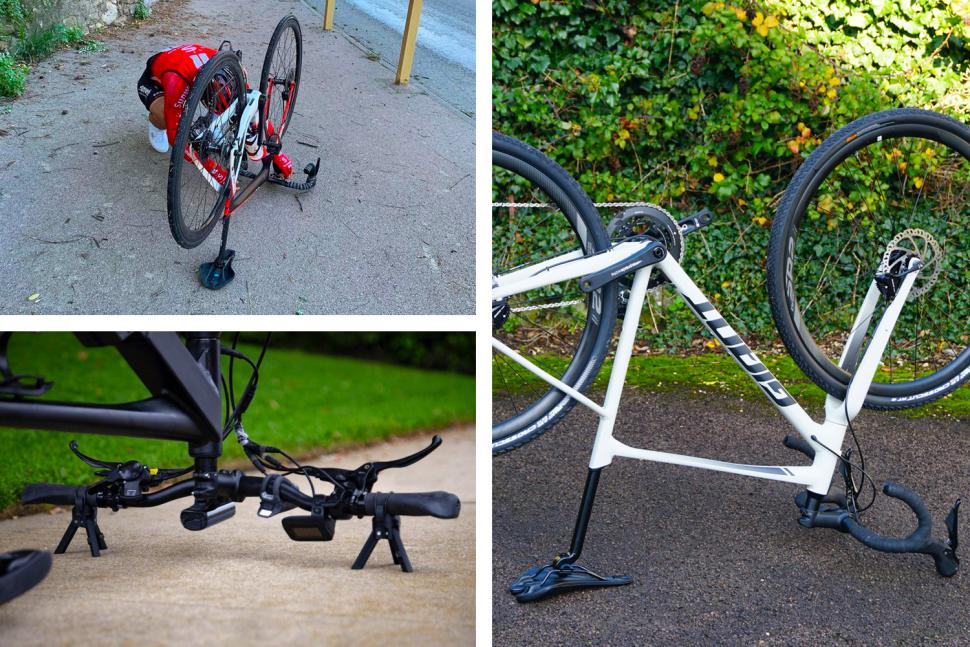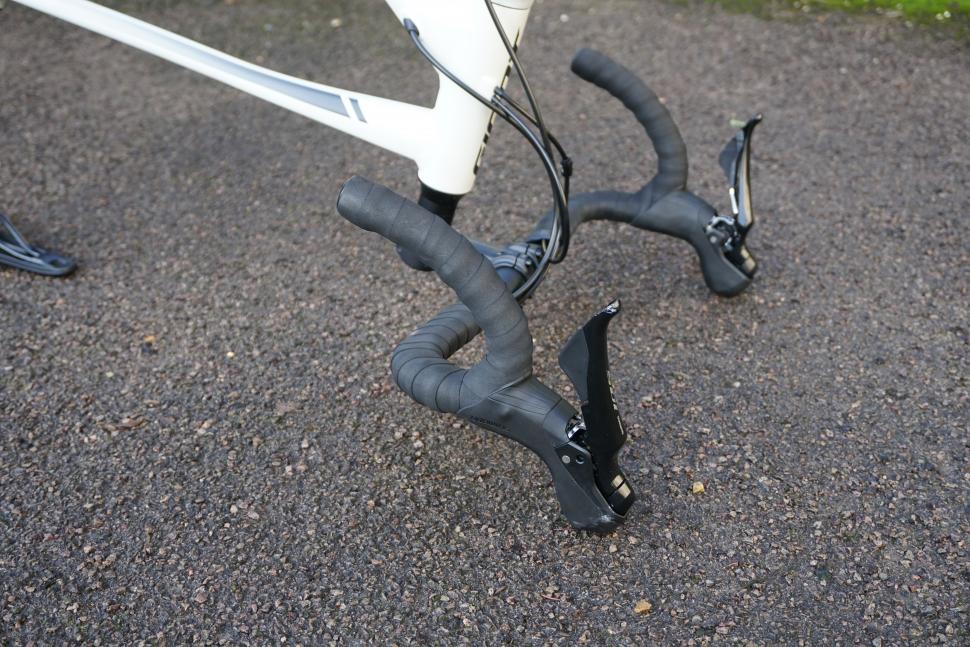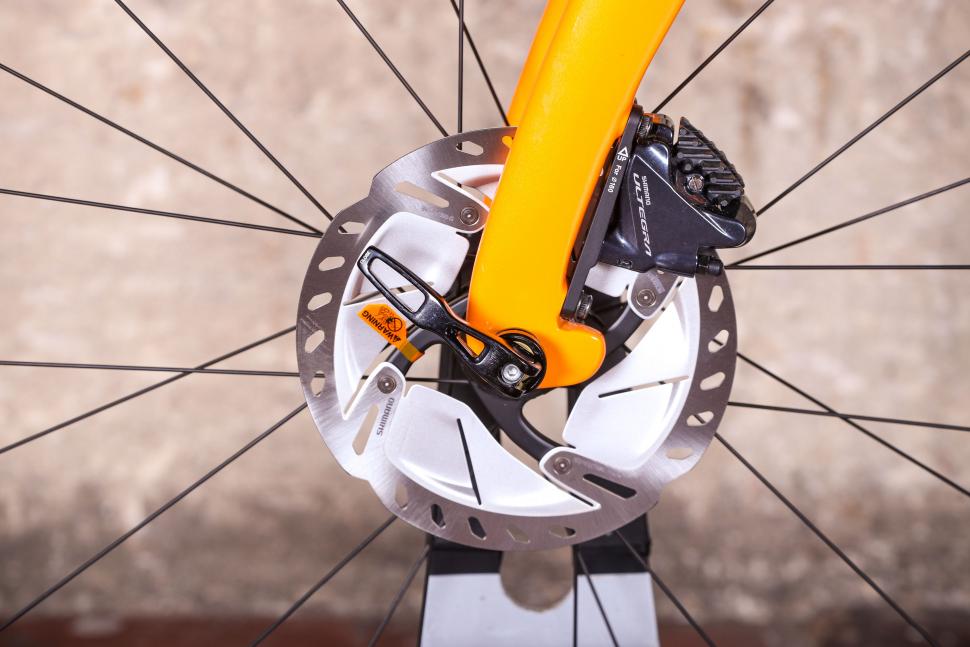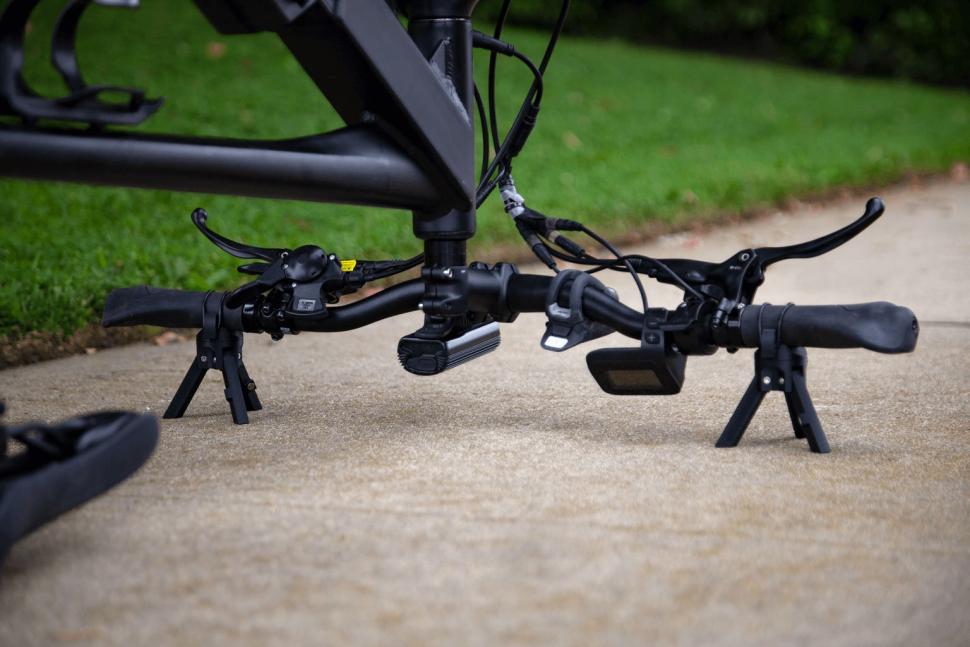- News
- Reviews
- Bikes
- Accessories
- Accessories - misc
- Computer mounts
- Bags
- Bar ends
- Bike bags & cases
- Bottle cages
- Bottles
- Cameras
- Car racks
- Child seats
- Computers
- Glasses
- GPS units
- Helmets
- Lights - front
- Lights - rear
- Lights - sets
- Locks
- Mirrors
- Mudguards
- Racks
- Pumps & CO2 inflators
- Puncture kits
- Reflectives
- Smart watches
- Stands and racks
- Trailers
- Clothing
- Components
- Bar tape & grips
- Bottom brackets
- Brake & gear cables
- Brake & STI levers
- Brake pads & spares
- Brakes
- Cassettes & freewheels
- Chains
- Chainsets & chainrings
- Derailleurs - front
- Derailleurs - rear
- Forks
- Gear levers & shifters
- Groupsets
- Handlebars & extensions
- Headsets
- Hubs
- Inner tubes
- Pedals
- Quick releases & skewers
- Saddles
- Seatposts
- Stems
- Wheels
- Tyres
- Health, fitness and nutrition
- Tools and workshop
- Miscellaneous
- Tubeless valves
- Buyers Guides
- Features
- Forum
- Recommends
- Podcast
feature
 Is putting your bike upside down wrong March 2021
Is putting your bike upside down wrong March 2021Is putting your bike upside down wrong? 67% of you say not, so why the controversy?
Do you ever put your bike upside down? It’s a question that is sure to cause heated debate amongst cycling friends anytime a mechanical occurs and somebody flips their bike over to get a better look. Here in the office, we couldn’t agree if it’s just fine or social death.
So we did a poll on Twitter, and from 926 votes an impressive 67% of you said it’s just fine, you can’t see a problem with flipping the bike. Some of the accompanying comments were quite illuminating too.
Is putting your bicycle upside down to fix a mechanical okay ot a bad thing to do?
— road.cc (@roadcc) November 4, 2019
I did this once to pump up tyres in front of someone and they were horrified at me so much they put the bike back up & did it for me.
— Cycle Mummy (@CycleMummy) November 4, 2019
As long as you remember to remove your Garmin first, the sound of the screen breaking on top of a mechanical sucks!
— Matt Williams (@mattdwilliams) November 5, 2019
More cycle fraternity bullshit normally spouted by unfit 1ride a week lycra clad £4k carbon bike SKY team kit wearing Muppets (the same types I leave for dust on my £700 COMMUTER MTB much to their disgust) the same type that didn't cycle before 2012 London when became cool.
— Guy Fartin (@Hunting4Dragons) November 5, 2019
Bad cycling etiquette or just common sense?
It’s clear that turning a bike upside down is an act of bicycle etiquette that divides opinion. The phrase it’s “not very pro” is often bandied about, so suggest it’s the sort of thing a pro would never do.
But the pros do it sometimes, as this photo shared by Richie Porte on Instagram shows Michael Matthews turning his Cervelo race bike upside down.
However, it’s clear from the accompanying comments that it is frowned upon by fellow pros and ex-pros. Robbie McEwan said: “Can’t be a pro....a pro NEVER turns his bike upside down.”
Rule #49 pic.twitter.com/Bxa9U9rosi
— Mike (@Eng32Mike) November 4, 2019
It’s inevitably not long before the “rules” get quoted here. Thumb through the Velominati rules and number 49 is “keep the rubber side down. “It astounds me whenever I see a bicycle helplessly turned upon its handlebars and saddle while the pilot optimistically leverages every muscle in their face to inspect the vehicle for evidence of its mysterious ailment,” it says.
Why would you not turn your bike upside down?
The only time you want to turn the bike upside down is to see to a mechanical issue. The most common reason for turning a bike over is to fix a flat tyre. Let’s face it, getting a wheel out of the bike can tricky, especially as you have to hold the bicycle frame in the air to avoid scratching the dropouts on the ground. Flipping the bike makes it much easier, you can get to the wheels and the bike is upright, not lying in a grass ditch.
Fettling gears and brakes can also be a bit easier too, especially if you’re indexing the gears and need to spin the drivetrain.
Reasons to avoid an upside-down bike
There are some valid reasons why you might not want to turn your bike over, other than the look you might incur from other cyclists.
The biggest problem with spinning your bike upside down when you have a mechanical is that it risks damaging/scuffing the saddle and hoods of your pride and joy. You’re also going to get dirt, mud or water on your main contact points when you get back on the bike.
You’ll also have to pick up your water bottles as they’ll have dropped out of their cages and rolled down the hill. It the cages haven’t relinquished their grip on the bottles, they might not be leaking sticking energy drink all of your frame.
The other reason you don’t want to turn your bike upside down when you have a mechanical is that it rarely makes it easier to fix the problem that occurred in the first place. It can actually make it more difficult to diagnose or repair the problem.
More problems arise with the risk of getting covered in dirt from the tyres or grease from the chain when you turn the bike over.
What about hydraulic disc brakes? The disc brakes are a totally sealed unit with oil in the lever, caliper and hose, so in theory, the orientation of your bike shouldn’t make any difference to the brakes.
That said, we have seen people hang their bike up, or turn it upside down, only to then find the brake lever is all mushy. What is the likely cause is a small air bubble that was in the system has risen to the highest point, the caliper, and this has altered the feel at the brake lever.
Shimano even recommends against turning the bicycle upside down. In a manual for its hydraulic disc brakes it says:
“The disc brake is not designed to work when the bicycle is upside down. If the bicycle is turned upside down or on its side, the brake may not work correctly, and a serious accident could occur. Before riding the bicycle, be sure to operate the brake lever a few times to check that the brakes operate normally. If the brakes do not operate normally, stop using the brakes and consult a dealer or an agency.”
In reality, you’ll probably be okay with a temporary upside down bike, but you don’t want to be storing it upside down.
What are the alternatives?
You could hang the saddle from a tree, hook the handlebars over a fence or gate, or get a friend to hold your bike for you. You can even try the method of hooking the saddle over your head which is better demonstrated by the picture below.
We’ve even had our attention drawn to a product designed specifically for this usage. The Handlebar Jack is a portable bike stand that clips to the handlebars and protects the grips and controls from the ground and makes it more stable. It’s something else to spend money on and carry with you though, so we’re not sure it’s really a solution.
Summary
It seems there's really nothing wrong with putting your bike upside down then providing you're careful, making it easier to sort a mechanical or flat tyre. It's an interesting debate that clearly gets some people worked up though, and there are pros and cons for doing it. We'd love to know what you think so getting down into the comments section and let us know.
David worked on the road.cc tech team from 2012-2020. Previously he was editor of Bikemagic.com and before that staff writer at RCUK. He's a seasoned cyclist of all disciplines, from road to mountain biking, touring to cyclo-cross, he only wishes he had time to ride them all. He's mildly competitive, though he'll never admit it, and is a frequent road racer but is too lazy to do really well. He currently resides in the Cotswolds, and you can now find him over on his own YouTube channel David Arthur - Just Ride Bikes.
Latest Comments
- Wheelywheelygood 24 min 46 sec ago
Nothing to do with water it's that your not keeping up your numbers of people in wheelchairs hit by bikes while on the pavement, try going around...
- chrisonabike 27 min 6 sec ago
You've been quoted in the article as being concerned "about the safety of cyclist and vehicles”....
- S.E. 5 hours 9 min ago
My guess is that they sell mainly on the German market - feel free to correct me. That might explain why they are not "pushing" their products,...
- ktache 5 hours 34 min ago
Now Emily Chappell really liked the Lezyne , I have the HV version, good, but I find the handle uncomfortable in use. I've often wondered about the...
- biking59boomer 4 hours 41 min ago
What about this one!? Taken in Cardiff Civic Centre 1939
- Muddy Ford 5 hours 44 min ago
Charlie Alliston got 18mths and is the reference case (because there are so few cases) for all campaigns by anti-cyclists that 'cyclists are not...
- belugabob 6 hours 46 min ago
My local football practice pitches (all weather, in a fenced off area, are regularly the scene of inconsiderate parking, with vehicles blocking the...
- Spangly Shiny 7 hours 11 min ago
Assos ASOS anyone?
- chrisonabike 7 hours 24 min ago
Replace them all with Bromptons and they'd take up zero space within days or even hours, as they are all relocated elsewhere. To eBay or possibly...
- Andrewbanshee 7 hours 55 min ago
Where I live we are experiencing a lot of housing development on small and large plots of land. These developers don't seem to have problems...



Add new comment
84 comments
That makes perfect sense. I'd totally forgotten about the old brake cables, having not seen such a thing since about 1990! That's where it comes from, it doesn't matter any more. Can we move on to really important stuff, like why some cyclists don't respond to a "good morning"? (How rude!)
Well, I do. I've always had a big block of wood to pop under the handelbars when it's upside down in the driveway getting its monthly chain wash (off the bike). Away from home... never seemed a big problem, really. Put it on a bit of grass, avoid pressing down on the front, cables never got kinked as far as I remember.
couple of these on the bars...
clips.png
I was always told you should never put your bike upside down whilst you are riding it.
Or vice versa?
sky-bike-upsidedown-bicycle.jpg
Sort of (is that Boatsie down under?). No, the reason is that it makes you break then bleed.
Don't think MacAskill got the memo on that one....
Flipping an hydraulic brakes bike upside down is going to do naff all to the system. If you have an air bubble in the system, it doesn't matter where is it, its going to make the brakes feel spongy.
A proper bled system doesn't care which way up or down
Even properly-bled systems may have some air in the reservoir in the lever. If the bike is upside-down and the brake is operated, the air bubble may get past the piston and into the active part of the system, causing sponginess. If the brake lever isn't operated, the air will remain in the reservoir. If you do turn a bike with hydraulic brakes upside-down, DON'T operate the brakes.
A couple of months back I was finishing up my run in the park when I spied a baffled looking millennial peering at his bike. As I approached I could see the chain had jumped off the chainset, maybe as he'd gone over a bump or perhaps as he'd shifted down a bit too sharply. He was looking at his phone and I realised he was Googling a video of how to put a chain back on.
"Chain come off?" I asked.
He nodded and said, "Do you know how to fix it?"
"Yeah," I answered, taking the bike from him, flipping it upside down, putting the chain back on the sprocket and cranking the pedal until the chain engaged the whole way round. "There you go. You'l know how to do it next time," I said, flipping the bike back on its wheels again and passing it back to him.
Strap a bike stand on your back when you go out?
I am sure the last time this debate was had it was universally agreed that having your support crew drive behind you with a mechanic and a portable workshop was the best solution.
For about 35 years that's how I serviced my bikes was to flip it upside down when needed. About 7 years ago I decided to use a work stand instead, while the work stand is more convenient plus more stable, flipping it upside down works too. The problem with flipping it upside down is I had to put books under the handlebar so it wouldn't easily tip over (I had the older bikes with the cables coming out of the top of the levers). I never scuffed a seat doing this so not sure what all the fuss about that is. I rarely flipped the bike on the road though to fix a bike the ground was just too unlevel to do that without the bike just falling over, though a sidewalk works great. Fixing a rear flat on the road isn't that big of a deal, of course most older bikes had chain keeper knobs that were brazed onto the chainstay which made it a lot easier.
Mountain bikes are easy to flip upside down and have them stay in place on almost any surface.
This is how I remove the rear wheel when I can't flip it upside down: https://www.youtube.com/watch?v=2pnbJ64zvME The only thing they don't show you on this video is what to do with the bike once you get the wheel off, this should be obvious to all of you, but you lay the bike down on it's side with the derailleur facing up.
Books! Books are items of social and cultural importance, to be revered, nurtured and cared for, not mistreated. How do you stop them getting dirty, scratched, wet or greasy if you do that? What is wrong with using a couple of bits of 2x2 instead? Philistine!
(I agree with everything else you said, though )
)
You can use Dan Brown books though. They don't count. And all those Lance Armstrong ones they've got down our local charity shop.
What a load of precious ninnies spouting bollocks about never turning a bike upside-down.
The one point that has any validity is the air bubble in the hydraulics, granted, and the crunch of breaking Garmin is another, but really, what careless clot wouldn't think of that?
"It looks unprofessional" - tripe, I say, utter utter tripe.
So what if it scratches the seat or bars? What matter is that?
Heretic!
Some of us like to look after our stuff. Scratch your bars up, bend the nose of your saddle; I don't care, and I have no idea why anyone cares that I don't want to damage my bike unnecessarily.
In that case turn bike upside wdown and place gently on floor. Voila, no damage.
Far more likely to damage bike whilst fettling with it when it can easily fall over.
Out of curioisity , how on earth do you hold bike off floor whilst fixing a puncture?
I usually rest it on a bidon. Couldn't give a toss about those. Or hang it by the underside of the saddle on a nearby bit of street furniture or tree.
This is scraping the editorial barrel - even for Road cc standards... Have they posted this article for a bet to see how many numptees respond? Can't wait for the 'updated' article in 6 months...
That looks like a hydraulic disc braked bike, in the picture of the article. I really wouldn't turn one of those upside down.
Hell yes I do!
Never; I take the following approach: the world is full of street/ lane furniture, such as gates, and chain fences, etc.
When I get a puncture, (the only reason why I might need to remove a wheel) I look for a convenient post, gate, etc. On which I can hang the rest of the bike.
This keeps the rear mech. and chain from coming into contact with yet more filth, in the case of a rear wheel puncture, whilst I change the inner tube.
No, the only air that might get into the system is if someone pulls a lever whilst the calliper is higher than the lever AND (see my semi-retraction above...) there happens to already be air in the reservoir. This has happened to me when e.g. inquisitive train guards pull the lever on your downhill bike on the way to a race, d'oh!
If this happens the best bet is to leave bike overnight with brake levers held down by rubber bands, hopefully bubble will sneak back into place.
The fact that this is a relatively well known fix suggests that there are a LOT of improperly bled brakes out there, my guess is that it's harder to put reservoir cap/diaphragm back on without also introducing some air into reservoir. I've not bled a brake in a few years now so don't know if newer levers/diaphragms are easier.
Thanks, that's good to know.
On the hydraulic brake issue, how is it when taking the bike on trains with these terrible hook/hanger systems?
As the bike will hang for a considerable time with much shaking, is there a risk of hydraulic fluid getting out or bubbles accumulating that's not fixed with a few pulls of the brake lever afterwards?
upside down every time.
hoods can get scratched but I don't particularly care...I'd more likely scratch the paint if I faffed about trying not to turn it upside down whilst fixing a puncture etc.
each to their own...that 'Guy Fartin' comes across as a massive bell-end though. Don't know why road.cc decided to include troll tweets like that.
I always bring a Park PRS-33.2 Power Lift Shop Stand with me.
The important question is: Is it a boat?
Pages